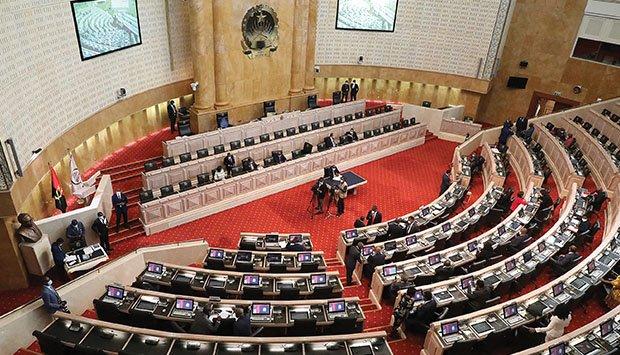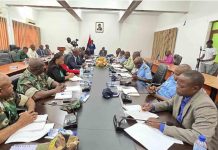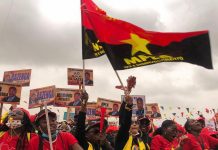Africa-Press – Angola. The National Assembly proceeded this Thursday, in Luanda, to the final global vote on the draft Law on Insurance and Reinsurance, the Code of Administrative Procedure and the Statute of the Insolvency Recovery Administrator.
Of the three diplomas that received a “green light” from parliamentarians yesterday, during the 5th Legislative session of the IV Legislature of the National Assembly, only the Draft Law on Insurance and Reinsurance Activities received a vote against, by deputy Makuta Nkondo, who, in his statement voting, mentioned the “catastrophic service” at the different branches of the aforementioned institutions.
“When paying for insurance, citizens are well received, but at the time of filing claims, insurers come up with many tricks, even treating the customer as a beggar”, said deputy Makuta Nkondo.
UNITA deputy, Sofia Mussenguela, said that her party’s parliamentary bench voted in favor of the diploma, considering that it is aimed at expanding the market and promoting the exercise of insurance and reinsurance activity in the country.
Just yesterday, the deputies approved, in general, the Draft Law on the General Regime of Administrative Offenses, with 149 votes, one against, and no abstentions.
The Secretary of State for Local Authorities, Márcio Daniel, clarified that criminalized conduct, despite being socially intolerable, does not require a penalty, must be decriminalized, thus leaving open a vast field for intervention and progressive expansion of the law. misdemeanor.
He pointed out the restriction of competition, offenses against public hygiene and health, the environment, the national economy, tax authorities, land use planning, peace, security and public tranquility, as practices that make the legal regime of offences “essential”.
During the discussions, UNITA parliamentarian João Caweza questioned: “Who can apply the administrative offense in the country, since the courts have only powers to assess the appeals of the municipal administrative entities that impose fines. On the other hand, he wanted to know about the reason for the discussion and approval of the bill, when the municipal legislative package is not fully approved.
The UNITA deputy also questioned whether the aforementioned draft law is intended to transfer powers from local authorities to municipal administrations, a concern that was promptly answered by the Secretary of State: “It is neither the intention nor the object of this law to deal with this matter. The matter of transferring the State to local authorities, already carried out by Parliament, when, on April 22, 2020, it unanimously approved the Law for the Transfer of Powers from the State to Local Authorities . , recalled that the Draft Law on the General Regime of Administrative Offenses demonstrates the high level of legislative reform underway in the country.
He underlined that the elements that motivated the denomination of the ordinances, are related to the fact that Angola is an independent and sovereign State, which respects the dignity of the human person, and fights for the creation of a free, fair, democratic and solidary society. . Yesterday, parliamentarians unanimously approved the draft resolutions that they approve, for Angola’s accession to the International Agreement on Tropical Timber (ITTA-2006), as well as to the African Trade Insurance Agency.
These diplomas were presented by the Secretary of State of the Ministry of Foreign Affairs.
Defending the well-being of national citizens
Before the agenda period, political statements were read by the leaders or representatives of the parliamentary benches. The vice-president of the MPLA Parliamentary Group recalled, by the way, that the Executive and the ruling party are concerned with carrying out actions that lead to the satisfaction of society’s needs.
Cruz Neto said, however, that it is important to comply with the rules of social peace in the country. “We need to order society with lawful behavior”, warned the deputy. In his speech, he criticized UNITA’s stance, for acting in the sense of privileging “government negativism, that is, denying everything, including even what they recognize as being well , seeking to capture the sympathy of those who have to choose, to be an option for the ruling party”.
After welcoming the commemorative dates on the Days of Angolan Women, Father (19 March) and Former Combatants and Veterans of the Fatherland (15 March) and 23 which honors the liberation of Southern Africa, the parliamentarian clarified that the Law on insurer and reinsurer, revokes legislation over 20 years old, correcting gaps and institutionalizing ARSEG as an Independent Administrative Entity to regulate the activity, avoiding political interference.
“We seek to fulfill the constitutional imperative of institutionalizing an independent administration, which cooperates with the direct administration of the State or the Executive”, he said. In relation to the diploma approving the Code of Administrative Procedure, he said that it creates the bases to discipline the steps, deadlines, procedures or the path that should lead to the decision of public servants on the activity of the Public Administration.
The leader of the UNITA bench, Liberty Chiyaca, addressed a good part of his political statement pointing out governance errors, stressing the importance of deepening the rule of law and the independence of the judiciary, depriving the public administration of parties.
Lucas Ngonda, from FNLA, addressed his speech to the Draft Resolution that points to the ratification of the Protocol on Forestry Activities of SADC, a diploma that should be analyzed and voted on today, in the continuation of the plenary session. He defended that due to the “immense forest resources” it has, Angola must adhere to international conventions that seek to implement procedures capable of promoting the sustainable development of policies for the management and use of forest resources in tropical countries.
For Lucas Ngonda, the exploitation of wood in the country deserves special attention, as it is a sector that involves a strong presence of rural populations, who use forest resources as the primary source of family income.
Manuel Muxito, from the PRS, when referring to the Draft Law on the General Regime for Administrative Offenses, said it was necessary to distinguish between an administrative offense and a crime, since the latter harms or endangers legal assets and values fundamental, while administrative offenses constitute pure obedience to the orders or commands of the administration.
For More News And Analysis About Angola Follow Africa-Press






